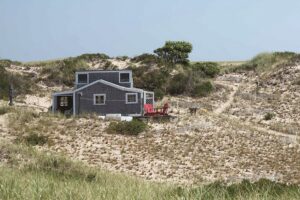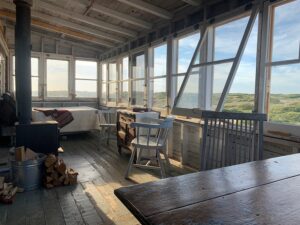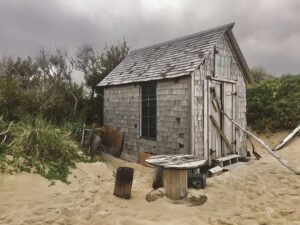PROVINCETOWN — The National Park Service announced last week “the opportunity for any interested individual” to lease a historic structure in the Dune Shacks of Peaked Hill Bars Historic District, on the back shore of Provincetown and Truro.
There are 18 dune shacks — rustic dwellings with history and style but no plumbing — in the district, and eight of them are now available for 10-year leases, the May 1 announcement said. Applications will be judged on six criteria, one of which is how much rent the bidder offers to pay.

Both the Cape Cod Times and the Boston Globe reported the news as a real estate opportunity; in fact, both newspapers used the phrase “here’s your chance” in the opening lines of their articles. The Times called the dune shacks “the ultimate Cape Cod vacation home,” and the Globe wrote that “compared to most waterfront properties in Massachusetts, the price is right.”
Neither newspaper mentioned that the dune shacks have been a fiercely contested cultural resource for decades. Nor did they mention that the Park Service signed an agreement in 2012 specifying exactly how dune shack leases should be managed — an agreement that it is now ignoring.
“The irony is that all of this process was federally funded,” said Peter Clemons, who with his wife, Marianne Benson, has lived in a dune shack every summer for decades. “We didn’t ask to meet with an ethnographer; we didn’t ask for a slew of meetings with cultural resource experts. This was their way of collecting data, and they’ve basically thrown it all out with the trash.”
A timeline drawn up by Cape Cod National Seashore historian Bill Burke, dated Dec. 1, 2009 and given to Clemons and Benson not long afterward, details a years-long public process on management and preservation of the dune shacks dating back to the early 1990s. There are meetings, reports, and inventories of all kinds, including a 256-page ethnography conducted by Robert J. Wolfe and a 143-page Historic District Registration Form.
This process culminated in May 2012 when Cape Cod National Seashore Supt. George Price and the Park Service’s Regional Director Dennis Reidenbach signed a Dune Shack Historic District Preservation and Use Plan. The 163-page plan specifies exactly how the dune shacks should be offered for lease and how new applications should be evaluated.
“For medium-term stewardship and occupancy (3-10 years), which would be used to provide the opportunity for new entrants into the values, culture, character, and practices of the historic district, the following decision criteria (in no particular order) would be added to the standard NPS criteria for the leasing of historic properties,” the document says.

The five additional criteria are knowledge of the surrounding environment, capacity to perform required maintenance, commitment to public access opportunities, availability to use the shacks, and commitment to the values of the historic district and continuation of tradition.
A 14-member committee — including dune shack dwellers and representatives from Provincetown, Truro, and three nonprofits — worked with facilitators and National Seashore employees to draft that language in 2010. The 2012 report that revised and adopted those terms names 19 Park Service employees as contributors.
None of that work appears in the current documents, however. The criteria that Price and Reidenbach approved for leasing the shacks in 2012 are not in the current Request for Proposals (RFP).
Instead, there are six “evaluation guidelines” — all directly copied from federal regulation 36 CFR 18.8(e), which applies to all Park Service leases — and there are six selection criteria, which are restatements, in paragraph form, of those federal guidelines.
“The decision on the criteria for the shacks was a sort of joint effort” between the National Seashore and the Park Service’s regional office in Philadelphia, said Cape Cod National Seashore Administrative Officer Stacey Ferguson, who is the official contact for the RFP.
“There was a sort of standard language, standard provisions provided by the region, and then with input and feedback from the Park,” Ferguson said.
The National Seashore had the opportunity to advocate for provisions to be added to the RFP but did not do so, said Ferguson.
“We were given the opportunity to weigh in,” Ferguson said. “If there were larger changes or other pieces that we wanted to change, we were able to advocate for those changes. It was a very collaborative process, and all the concerns and criteria that the Park wanted to see represented are represented.”

In other words, according to Ferguson, National Seashore officials were not overruled by higher-ups in Philadelphia. Rather, the leadership at the Seashore simply did not advocate for the proposals endorsed by their own predecessors.
When asked about the criteria that Price and Reidenbach published in 2012, Ferguson said, “I would argue that those bullet points are captured, maybe in a different way, but they are represented in the RFP.”
When asked about specific criteria, however, Ferguson said, “I will have to get back to you on that.” Asked if any of the published criteria were not from preexisting federal code, she said, “I don’t want to comment, because I have to take a look and get back with you.”
Ferguson did not respond to follow-up emails from the Independent.
The criteria were a focus of attention for years because they determine who can apply for leases for the dune shacks and who can win them.
For instance, the local nonprofit organizations that currently manage seven of the 18 dune shacks are barred from applying under these rules. “Hybrid uses,” such as a leaseholder living in her shack in the summer but offering it to an arts organization in the winter, were encouraged by Price and Reidenbach but are forbidden by the new RFP.

Many of the families and caretakers who currently hold special-use permits for a dune shack now plan to apply for 10-year leases. The selection criteria will determine whether their experience and knowledge counts in their favor — and whether they can be outbid by someone who will offer more rent.
According to 36 CFR 18.8(e), the criterion that allows the Seashore to evaluate applications based on how much rent they offer to pay is optional. That means it is the only criterion, beyond the five mandatory ones, that the Park Service made an affirmative choice to include.
“I feel the RFP as written does a complete disservice to the cultural landscape of the dunes,” said Michela Murphy, who serves on Provincetown’s historic district commission. “It puts profit over preservation — it essentially allows any person who has a good amount of money to say, ‘Hey, we have the money — we can hire staff to maintain it.’ ”
“There are big questions as to whether the current staff is aware of the work that preceded them, whether they understand how important it was, and how much previous leadership valued it,” said cartographer Mark Adams, who worked for the National Seashore from 1993 to 2020. “There was a real air of animosity in the mid-’90s, and I haven’t seen that at all in the last decade.
“Either they’re ignorant of the whole history here, or they’re trying to bureaucratically sweep it away,” Adams said.
“I would like to know if these are being treated as cultural resources or as assets for real estate purposes,” Adams added. “Of course, they’ll say, ‘The best way to protect them is to put them in the hands of people who can maintain them.’ But there’s an aspect of culture that’s based on people.”

The Preservation and Use Plan approved by Supt. Price in 2012 sets out four overarching goals, only one of which is about the preservation of historic structures. The other three refer to traditions, culture, and the arts — words that do not appear in the current RFP’s guidelines or criteria.
The RFP also says the shacks may be used from Memorial Day to Labor Day, with “access for maintenance” through the end of October — despite the fact that people who live on Cape Cod routinely call September the most beautiful month here.
“Artificial Intelligence has kicked in big time,” said Peter Clemons. “This is constructed out of the same terms they use to lease a piece of land to a drive-in theater. They have no clue what they’re talking about, nor do they care, I guess.”
Andrew Clemons, Peter and Marianne’s son, has spent summers in his family’s dune shack since he was born. He was less surprised by the Park Service’s about-face on its long-published leasing terms.
“After having these conversations going on all around me for 43 years, it feels like that’s their strategy,” he said. “Every couple of years they introduce a new conversation, and it plays itself out, and then it gets abandoned as if it never happened.
“I can hear echoes in my mind of what I said for the Wolfe report, when I was 24,” said Andrew, referring to the ethnographic study from 2005. “Now here I am, saying the same things.”



